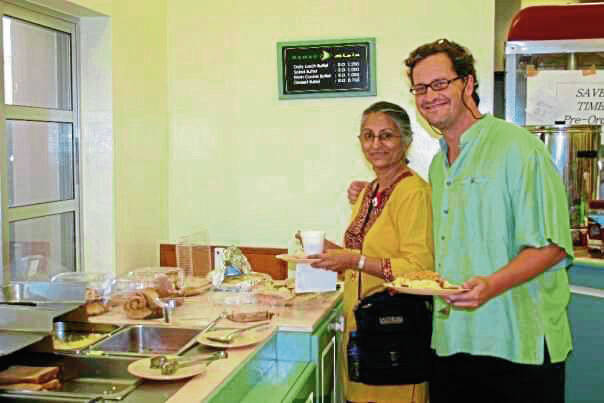Marc Fogel taught high school history for nine years in Moscow, Russia, an experience he found fulfilling.
Now, he is a prisoner in the dark, impenetrable side of that Russia, under the iron hand of its absolute authority. All of Russia has lived for centuries in the shadow of that ruthless power.
When I learned that my friend and onetime colleague, Marc Fogel, an Oakmont resident, a husband, father and loving family man, had been sentenced by a Russian court to serve 14 years of hard labor in a penal colony, my heart sank.
Images of the bleak, brutal, dehumanizing conditions of prisoners that we know from the words and pictures of Joseph Stalin’s victims played like a filmstrip in grainy black and white in my mind.
That’s the past, I told myself. This is the 21st century. Russia is not under a totalitarian government.
But I found out that Russian penal colonies, their labor camps today, are shockingly similar to those that existed several decades ago.
“Due to the absence of a major overhaul of the prison service, whose institutions and Code of Conduct date back to the time of the Soviet gulag, the prison system is an excellent example of pathologies that are also present in other elements of the Russian state apparatus,” says a detailed, extensively researched report of the Centre for Eastern Studies (OSW) in Poland.
In 2018, Vladimir Putin declared that there was no immediate plan to reform the prison system.
Under Putin, Stalin’s image is being rehabilitated, and the government has airbrushed Stalin’s crimes against Soviet citizens. Putin has made Alexander Solzhenitsyn’s “The Gulag Archipelago” essential reading for schoolchildren. If Stalin’s image is being rehabilitated, and, simultaneously, the terror that he unleashed is made essential reading, I think it is a dire warning to the youth: A strong leader wields fearsome power.
There are published first-person reports of hard labor in Russian penal colonies. Nadezhda Tolokonnikova and Maria Alyokhina of Pussy Riot have spoken graphically about their prison terms, as has Mikhail Khodorkovsky, once a Russian oligarch, who served a 10-year sentence.
A disturbing image in the documentary film “Citizen K” haunted me. In that documentary, Khadarkovsky appears in court in a cage. Little did I know then that my friend Marc would be subjected to that indignity. Marc had been detained, yes, and he was standing trial, but he wasn’t at that time a “criminal.”
Armand Rosen’s photo essay in the Atlantic Monthly confirms my fear that prisons in Russia today continue to evoke memories of Stalinist camps. Rosen’s images behind the walls and fences of contemporary Russia’s prison camps, some of which are located deep in the stark and cold Siberian wilderness, are haunting in their desolation.
At this time of deep tensions between the U.S. and Russia, prisoner Marc Fogel will be at the bottom of the food chain because he is an American.
I wonder if he is going to be transported in a crowded, cramped railway car to some unknown destination to serve out his exorbitant sentence, with no information to the family.
Some have argued that Marc knew he was breaking a law when he carried his medical marijuana into Russia. And so, he must pay the price.
That’s a valid perspective, except that he is being punished in a country with what’s been called a “very dubious legal system.”
Given the nature of Marc’s relatively minor transgression, I would argue that his detention is sentence enough and should amount to the time served so far. There’s a Russian law that says that every day in “remand custody” prior to sentencing, and while being transported, counts for 1½ days. Was Marc in remand custody? We don’t know. We don’t even know where he is being held.
Marc is a hostage in the hands of the Russian government to bargain with the U.S. government for things it desperately needs.
Humanitarian considerations should apply to Marc, who is 61 and suffers intense pain from past surgeries on his spine and a hip. Marc is a beloved teacher in international schools in many countries, with literally hundreds of past students and colleagues now calling for his freedom.
Marc Fogel needs to be immediately declared as “wrongfully detained.” Officials in the highest positions of power in the U.S. must spare no effort, lose no time and bring him home from an inhumane prison sentence in a penal colony, the same as every U.S. citizen “wrongfully detained” in Russia.
Kamakshi Balasubramanian is a retired educator who specialized in Russian language and literature. She lives in Mysore, India. She and Fogel taught together in an international school in Muscat, Oman.













